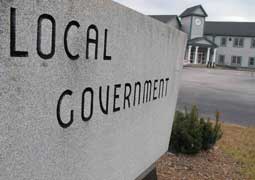
The pothole-strewn road in front of the Phokwane Local Municipality in Hartswater, in the Northern Cape, tells a story of a municipality that is on its knees and unable to deliver basic services to its residents. But the elected council and some of the stakeholders within the municipality are vehemently opposed to the decision by the provincial executive to institute section 139 (1)(b) of the Constitution.
The Select Committee on Cooperative Governance and Traditional Affairs, Water and Sanitation, visited the municipality as part of its constitutional obligation to agree to or reject the decision taken by the provincial executive.
The Chairperson of the committee, Mr China Dodovu, said that there are clear signs of dysfunctionality within the municipality which have impacted negatively on service delivery to the people.
“The committee will have to consider all the submissions made by all the stakeholders and then it will recommend its decision to the National Council of Provinces. One of the considerations that the committee will make is whether it would not be worthwhile to dissolve the municipality because there are clear divisions within the municipality,” said Mr Dodovu.
Some of the reasons highlighted by stakeholders is that the provincial executive was quick to institute section 139 (1)(b) without first considering some of the tools provided by the Constitution, like section 139 (1) which calls on the provincial executive to issue a directive to the municipal council, describing the extent of the failure to fulfil its obligations and stating any steps required to meet its obligations, as well as section 154 (1) which empowers the provincial executive to offer support to municipalities to perform their functions.
To highlight their opposition to the intervention, the council has taken a decision to approach the court to stop the intervention.
But the province-appointed administrator of the municipality, Mr Baba Ndwandwe, said there are very serious challenges facing the municipality, most of all the financial challenges that, according to him, have rendered the municipality unviable.
‘Even if we were at 100% revenue collection, there would still be a budget shortfall of R13 million which makes the municipality financially unviable,” Mr Ndwandwe said.
Compounding matters worse is the huge debt the municipality owes to Eskom, Vaalharts and Sedibeng water boards. Currently, the municipality has more than R227 million worth of debt on its balanced sheet. The municipality owes Eskom R107 million, Vaalharts Water R43 million and Sedibeng Water R76 million.
Councillor S Lewis said she doesn’t believe that the municipality owes Sedibeng Water any substantial amount of money mainly because Sedibeng collects revenue on behalf of the municipality. “We are concerned, but are happy that they are here and we will expect to get a full briefing and how it charges the municipality,” Councillor Lewis said.
Some of the challenges the administrator faces on a daily basis include the inability to convene council meetings to pass the IDP (Integrated Development Plan) and the budget.
The committee highlighted the need to respect the Constitution and urged stakeholders to play a meaningful role in the delivery of its mandate. The committee will deliberate on the intervention and will highlight if it agrees with the intervention or not.
By Malatswa Molepo
3 September 2019

